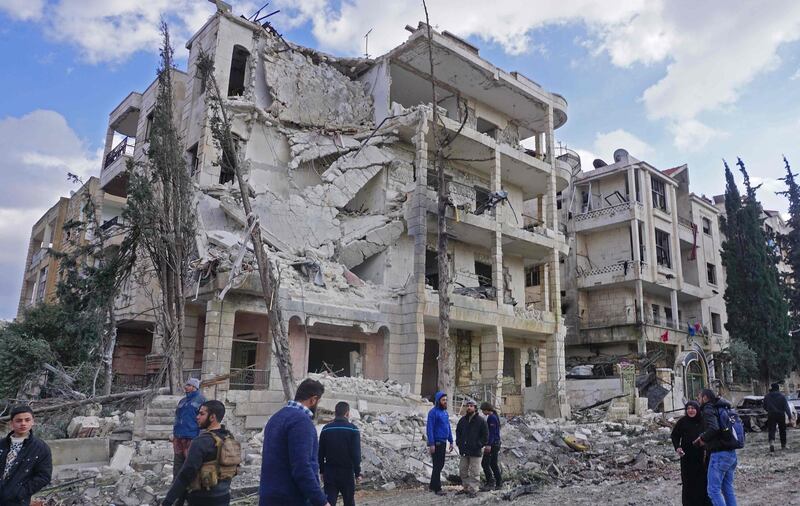On Thursday, leaders from Russia, Turkey and Iran will gather for the 12th round of Astana talks. But these meetings have gone on for so long that they have outlived the name of the capital of Kazakhstan, where they are held. The city is now called Nursultan, renamed last month after the country's former president, Nursultan Nazarbayev.
In this place with a new name, an old problem is sure to be debated: what is to be done about the Syrian province of Idlib?
In September, a deal was agreed that prevented an all-out assault on the province and averted a humanitarian crisis. But now that very deal has enabled the militant group Hayat Tahrir Al Sham to entrench its rule across a wide part of the province and control the lives of three million Syrians.
Hayat Tahrir Al Sham was once known as Jabhat Al Nusra, an Al Qaeda affiliate inside Syria until the two parted company in 2016. It is also not the same group it was in September last year. It has defied a Turkish and Russian order to give up its heavy weaponry, emerging even stronger.
Idlib is the last major population centre in Syria to remain outside of regime control. For years, it was the place rebels from other parts of Syria escaped to, with the result that of the three million people there, approximately half are from other parts of the country. Look at it on a map and it is obvious why the province is so strategically important: the vital M5 highway between Damascus and Aleppo runs through it; it is close to Turkey’s long border and within mortar-firing distance of the Russian base at Hmeimim.
As such, it is critical to both Russia and Turkey. In September last year, as the Syrian government began what seemed like a final push for Idlib, there were dire warnings that a humanitarian catastrophe was about to unfold. Eventually, Russia and Turkey agreed a deal, carving out a demilitarised zone around the province and requiring militant groups to give up their heavy weaponry, or join a Turkey-backed umbrella force.
Almost immediately, Hayat Tahrir Al Sham began to strike against other similarly motivated groups inside the province, assassinating leaders and taking territory. Since it refused to surrender its heavy weapons, it appeared as if it was eliminating competitors and consolidating its position for leverage, in advance of a regime or Turkish assault. But that assault never came, and as the autumn became winter, it quietly continued its expansion.
Then, in January, came a pivotal change. Hayat Tahrir Al Sham, which had previously been confined to the city of Idlib in the centre of the province, tried to take two strategic towns. The first, Maarat Al Nuaman, would grant it control over the main highway between Aleppo and Damascus, while the second, Arihah, would allow it to control the main highway west towards the coast.
Both assaults were successful and the group forced the Turkey-backed Free Syrian Army to accept a ceasefire. The end result is that Hayat Tahrir Al Sham’s political arm – “the salvation government” – is now the effective administrator of the entire province, from water and electricity, to roads, schools, hospitals and security.
This is where comparisons with ISIS's attempts to build a proto-state come in. In one regard, though, they are overblown. Hayat Tahrir Al Sham is surrounded on all sides; its ability to expand territorially or gain more recruits is severely limited. Its power turns almost entirely on its ability to control a population and on external powers fearing the humanitarian cost of unseating it.
It is against this background that the Astana conference is being held.
There is still a chance that Russia or Turkey will launch an all-out assault to retake the province. But, given the enormous humanitarian consequences, that is unlikely for the moment. Hayat Tahrir Al Sham’s gamble in September appears to have paid off, as some of its rivals gave up their heavy weapons and the group was then given time to attack them.
Instead, the Astana talks will likely take a lower-profile approach, continuing the joint Russian and Turkish patrols that were started earlier this month.
The reason for that is political. There are two major issues rumbling in the region: the Turkish purchase of Russia's S-400 defence system, and the US withdrawal from northern Syria and the attendant fate of Syrian Kurds. Russia, in particular, does not want anything to jeopardise the former, and Turkey does not want anything that might push a mercurial US administration to reverse its decision to leave. That Hayat Tahrir Al Sham is bedding down inside the province is secondary, for now.
The wild card in all of this is the Syrian regime. Just last week, Bashar Al Assad expressed frustration that the buffer zone deal wasn't working and days later his forces shelled Idlib province. There is always the chance that the regime may start a conflict with Hayat Tahrir Al Sham to force Russia's hand.
In the eight months since September, the Idlib problem has become harder, not easier. Hayat Tahrir Al Sham now controls aid deliveries to Idlib's population. Already, according to the United Nations, sporadic violence between the regime and Hayat Tahrir Al Sham, and between the organisation and other small militant forces has led to civilian deaths and caused nearly 90,000 people to flee their homes in February and March.
But there are few places to go for Idlib's civilians. An unpopular, illegitimate militant group rules over them through intimidation and violence, while an unpopular regime glowers across the border.





